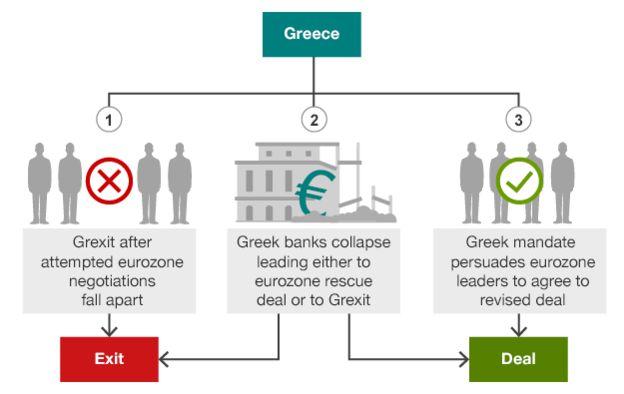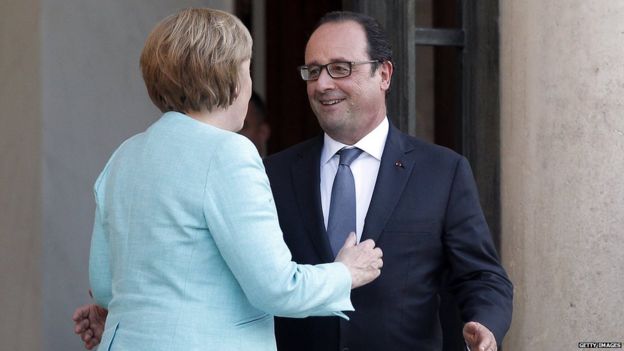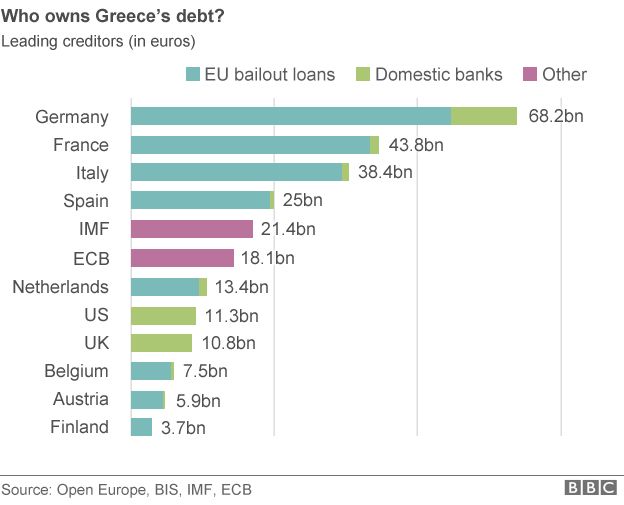Greece debt crisis: France presses to keep Greece in eurozone
By BBC News
France will do all it can to keep Greece in the eurozone, because allowing it to leave would be too risky, PM Manuel Valls has said.
"The basis for a deal exists," he said, ahead of an emergency eurozone summit in Brussels.However, Germany has warned against any unconditional debt write-off.
Eurozone ministers have called on Greece to put forward fresh proposals after Greek voters rejected the latest draft bailout deal in a referendum.
Greek Prime Minister Alexis Tsipras met Greek political party leaders on Monday and headed to Brussels on Tuesday morning, where he is expected to present new proposals.
Follow the latest updates
His plan is said to include a demand for Greece's vast €323bn ($356bn; £228bn) debt to be cut by up to 30%, with a 20-year grace period.
Greece's teetering banks are to stay closed on Tuesday and Wednesday.
The European Central Bank (ECB) is maintaining its pressure on the banks, refusing to increase emergency lending and ordering them to provide more security for existing emergency loans.

A picture of Angela Merkel wearing an old Prussian military helmet dominates the front cover of Bild. "Today," the headline reads "we need the Iron Chancellor!" referring to Otto von Bismarck, who first held the post.
For weeks the tabloid has been leading the charge against Greece. Like many here, it has had enough. "No more billions for Greece," it urged on Tuesday.
The chancellor is under huge domestic pressure not to cave in to Greek demands for debt relief. Her deputy, Sigmar Gabriel, has said that to do so would destroy the eurozone.
And on Tuesday the CSU (her party's Bavarian ally) went further: general secretary Andreas Schueur wants Berlin to reject further negotiations, let alone a third bailout package. The Bavarian finance minister, Markus Soeder, has said he simply wants Greece out of the eurozone.
And these are the MPs who will have to vote before negotiations over any proposed new deal can even start. Mrs Merkel says she wants to keep the eurozone together; she's got a battle on her hands at home first.
New demands
European finance ministers and officials gathered in Brussels told reporters they wanted to hear new proposals from Greece's new finance minister, Euclid Tsakalotos, ahead of a full summit of eurozone leaders later.Eurogroup chairman Jeroen Dijsselbloem said as he arrived: "The pressure is especially on the Greeks, the banks are closed and the situation is difficult. I guess the Greek government has an interest in coming up with serious and credible solutions soon."
European Economic Affairs Commissioner Pierre Moscovici added: "On Sunday the Greeks gave their voice but there are also 18 other countries with a voice."
Peter Kazimir, finance minister of Slovakia - one of the countries with the highest exposure to Greek debt - said he was "sceptical" that a deal would be found, adding that debt relief was a "red line for my country".
What are the scenarios for Greece?

- Securing liquidity for Greece's financial system
- Credible reforms with reduced recessionary impacts
- Strong programme for growth
- Restructuring of Greek debt - that could mean writing some off and rescheduling repayments.
'No taboo'
In his comments on Tuesday, Mr Valls said the eurozone could not "take the risk of Greece leaving" - for economic as well as political reasons."There is no taboo subject when it comes to [Greek] debt," he told French radio.
Germany, which takes a tougher line, has warned against any unconditional write-off of Greece's debt, amid fears it would destroy the single currency.

The differences between the French and German stances on Greece reflect a fissure running through the EU, say correspondents.
Several eurozone countries - including Malta, Slovakia and Estonia - are owed significantly more by Greece as a percentage of GDP than Germany or France.
With pressure growing on the Greek banking system, the eurozone summit will have to give a pretty clear signal that it thinks progress can be made.
But the two most important leaders in the eurozone, Angela Merkel and Francois Hollande, appear to be struggling to find a common position on Greece in the wake of Sunday's "No" vote.
Broadly speaking, some countries - led by France - are pushing for a deal that will give Greece some breathing space to stay in the eurozone.
Others - led by Germany - are under greater political pressure at home, and wonder whether such a deal is possible.
It all leaves Greece in the most precarious position it has experienced in five years of wrenching economic crisis. The best that can be said is that it could go either way.
It told the banks to lodge more collateral - or assets - with the Bank of Greece, reducing the amount of spare cash the banks have.
The European Commission - one of the "troika" of creditors along with the IMF and the ECB - wants Athens to raise taxes and slash welfare spending to meet its debt obligations.
Greece's Syriza-led left-wing government, which was elected in January on an anti-austerity platform, said creditors had tried to use fear to put pressure on Greeks.



0 Comments:
Post a Comment
Subscribe to Post Comments [Atom]
<< Home